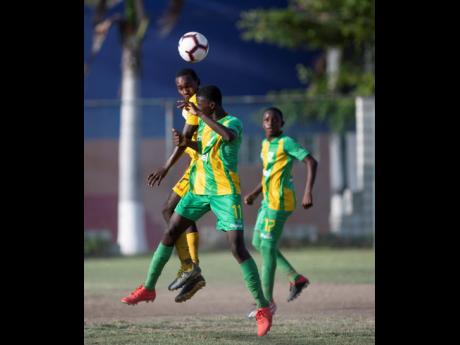Paul Wright | Heading is an unnecessary ‘skill’
Recently the Daily Telegraph, a British newspaper published a report from the Glasgow University in Scotland that revealed that footballers are three and a half times more likely to die from neurodegenerative diseases than the general population. This report brings, once again into sharp focus the problems associated with the heading of football in our youth games.
The children who are involved in the Manning and DaCosta Cup competitions are having to play the majority of their games in wet conditions as the inclement weather plays havoc with the scheduling of games in what is a really short season. Games are being halted or postponed at the first sign of lightning, a realistic precaution considering the physical and emotional trauma associated with lightning damaging children at play. Matches however are still being played in very wet conditions once there is no lightning threat. That, however, renders the passing game, or ‘tiki taka’ football, prone to errors thus there is an increase in high balls to team members, thus increasing the phenomenon of heading the ball.
Dr Robert Cantu, a noted expert on brain trauma, has reminded any who chose to listen, that there are 13 studies that have shown abnormalities on MRI studies that reveal a breakdown of the blood/brain barrier happening without recognised concussion from repeated trauma. These frightening facts, along with a lawsuit in the USA against the National Football League, governing body of American football, that accused it of “failing to take reasonable actions to protect players from the chronic risks created by concussive and sub-concussive head injuries, and fraudulently concealed those signs from players” has been successful.
Repeated sub-concussive blows have drawn relatively attention. The naysayers to an outright ban on heading in football have postulated that heading is not conclusively injurious to the brain; and heading is too fundamental to the game to be abandoned.
The publication of more and more studies showing the adverse effects of repeated sub-concussive blows to the head and the fact that in the early days of the football there was very little heading of the laced-up leather balls that once wet, were like heading a concrete structure, reminds us that the game can be played without heading. The new balls have eliminated the increase in the weight of the wet ball, but has dramatically increased the speed at which these balls travel through the air on the way to the player preparing to head the ball. The USA has banned heading in children under the age of 10 and are looking at the effect on heading in the women’s game, as females are more susceptible to repeated sub-concussive blows to the head than their male counterparts.
The relevant question for us in Jamaica is: What is being done by the Jamaica Football Federation and ISSA to protect our children who play football, from primary to tertiary level?
The world is now becoming more aware of the dangers involved in heading the ball in football. Heading is not necessary in the game of football. The game CAN be played without this “skill”. Football without heading would promote possession and passing with the onus on skill and movement with the ball on the ground. Are we really interested in the health of our children at play? Are we doing enough? Can more be done? The verdict, reader, is yours.
Dr Paul Wright is a sports medicine specialist and radio personality.
Suggestions to address in football heading:
- Ban heading the ball in all games where the participants are 10 years or younger.
- In all games where the participants are under the age of 18, make heading the ball a foul. As an added incentive to ensure compliance, make the referees who fail to award a foul when a ball is headed liable to legal sanctions.

